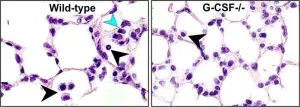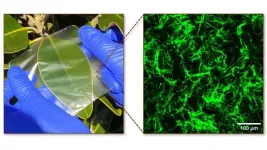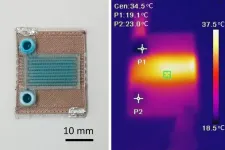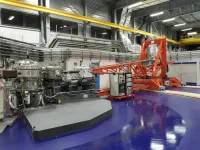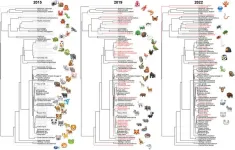(Press-News.org) Philadelphia, December 11, 2023 – Advancements in the care of premature babies are leading to improved survival rates. However, the incidence of neonatal diseases with life-long consequences such as bronchopulmonary dysplasia (BPD) and retinopathy of prematurity (ROP) is increasing. A novel study has implicated granulocyte colony-stimulating factor (G-CSF) in both BPD and ROP, making it a promising therapeutic candidate. The results appear in The American Journal of Pathology, published by Elsevier.
BPD, also called chronic lung disease of immaturity, afflicts approximately one third of all extremely premature infants, causing lifelong lung damage. It occurs in approximately 80% of infants born between 22 and 24 weeks of gestation. There is no effective treatment other than supportive care. BPD often occurs alongside the neonatal eye disease ROP, which impairs vision irreversibly, suggesting a related pathogenesis. However, specific mechanisms of BPD and ROP remain unknown.
Lead investigator Margaret L. Hibbs, PhD, Leukocyte Signalling Laboratory, Department of Immunology, Central Clinical School, Monash University, explains, “Our laboratory focuses on inflammation and its underlying mechanisms, and we have been studying myeloid colony-stimulating factors for many years. Previous work by us reported that G-CSF was pathogenic in chronic obstructive pulmonary disease (COPD), and this has now been shown by others to occur in asthma. Given the links between early life lung disease and COPD, it seemed reasonable to hypothesize that G-CSF may also be implicated in the neonatal lung disease BPD.”
Investigators used a neonatal mouse model of coincident BPD and retinopathy to screen for candidate mediators. Equal numbers of male or female mice were assigned randomly to normoxia (21% oxygen) or hyperoxia (75% oxygen) and were exposed within 12 hours of birth. The study revealed that G-CSF was significantly induced in mouse lung wash fluid and plasma in response to hyperoxia. This was validated in human disease as preterm infants with more severe BPD had increased plasma G-CSF.
Neonatal mice deficient in G-CSF exhibited significantly reduced alveolar damage and, correspondingly, showed minimal impairment of lung function following exposure to hyperoxia. This was associated with an ameliorated oxidative stress response, reduced lung epithelial cell proliferation, decreased migration of myeloid cells from the periphery into the lungs, and diminished myeloid cell activation. Deficiency of G-CSF also protected against retinopathy, suggesting wide-ranging protection.
Professor Hibbs notes, “Inflammation is highly implicated in the pathogenesis of BPD, so we speculated that G-CSF–dependent inflammation might be involved in this lung disease, but the surprise was that deficiency of G-CSF also protected against retinopathy. While more needs to be done to expand these findings, recent studies implicate neutrophils in ocular diseases such as ROP and diabetic retinopathy, and G-CSF is the major regulator of neutrophil development survival and activation.”
Co-investigator Evelyn Tsantikos, PhD, Department of Immunology, Central Clinical School, Monash University, comments, “These studies produced some surprises including the unexpected protection that G-CSF deficiency afforded to the endothelial compartment. While this may relate to the reduced oxidative burden, G-CSF receptors have been shown to be expressed on endothelial cells, so we are keen to investigate this finding further.”
First author Lakshanie C. Wickramasinghe, PhD, Department of Immunology, Central Clinical School, Monash University, adds: “These studies highlight the value of collaborative research – we could not have achieved the best research outcomes without involving clinical collaborators, Professor Atul Malhotra, who provided a first-hand look into the respiratory interventions provided in the neonatal intensive care unit; and Professor Anne Hilgendorff and Dr. Alida Kindt, who performed translational studies in BPD patients demonstrating significantly elevated levels of G-CSF in infants with more severe BPD.”
Professor Hibbs concludes, “Our studies identify a new mechanism in BPD that is therapeutically tractable and may help rescue the lungs and sight of infants from life-long damage. Neonatal lung and eye diseases are currently managed and treated as independent conditions. However, our findings suggest that G-CSF is a pathological mechanism common to both, which may advance a new therapeutic strategy to improve the care and long-term outcomes of these vulnerable premature infants.”
END
Researchers find promising candidate to treat irreversible lung and eye diseases in extremely premature infants
Novel findings reported in The American Journal of Pathology implicate granulocyte colony-stimulating factor (G-CSF) in both bronchopulmonary dysplasia and retinopathy in premature babies
2023-12-11
ELSE PRESS RELEASES FROM THIS DATE:
Public bodies “overwhelmed” at having to implement human rights laws, study warns
2023-12-11
Statt at public bodies can be “overwhelmed” by having to implement human rights laws into the working of their organisation when staff are in “awe” of legislation, a new study warns.
When laws are viewed as sacrosanct control over interpretation and implementation can be seen as the responsibility of a privileged few, according to the research.
This leads to staff placing greater weight on implementation through processes. Laws are seen as so specialist staff feel they do not have the perceived required knowledge and expertise and cannot be trusted to implement them.
Those who see equality and human rights law as malleable believe they should ...
If a piece of Turkey gets stuck in your throat this Christmas, there is no point in trying to free it with Cola
2023-12-11
Cola. A drink forever associated with the Christmas season. And also, for many, a liquid that can help clear a blocked oesophagus. Something that may be a bit more likely at this time of year. However, research from Amsterdam UMC, published today in the BMJ Christmas Issue, shows that this is not worth wasting the sugary stuff.
"Emergency physician Elise Tiebie, the driving force behind this project, saw online that this was really a rumour, from tip websites to Wikipedia as well as an anecdote in a British newspaper about paramedics saving a life by using cola. I've even heard doctors recommending it,” says Arjan Bredenoord, Professor of Gastroenterology at ...
McGovern Medical School names new neurosurgery chair; Tandon takes on role at UTHealth Houston Neurosciences
2023-12-11
Jacques Morcos, MD, a renowned neurosurgeon from University of Miami Health System, will join UTHealth Houston as the new chair of the Vivian L. Smith Department of Neurosurgery with McGovern Medical School at UTHealth Houston, effective today.
Morcos will also serve as co-director of UTHealth Houston Neurosciences alongside Louise McCullough, MD, PhD, chair of the Department of Neurology, and will be appointed as the Nancy, Clive and Pierce Runnells Distinguished Chair in Neuroscience.
Nitin Tandon, MD, former chair ad interim of the neurosurgery department, ...
Study: Women-led groups were key to food security during COVID-19 in India
2023-12-11
In March of 2020, India’s government announced a strict lockdown with just four hours notice, including a ban on the informal and traditional food outlets that 80 to 90 percent of Indians rely on for their main source of food.
In a new paper, “Applying the six-dimensional food security framework to examine a fresh fruit and vegetable program implemented by self-help groups during the COVID-19 lockdown in India,” published in the journal World Development, researchers from the Alliance of Bioversity International and CIAT looked at the effects of a government-backed women’s self-help group program in the state of Odisha, India and how it impacted the six ...
Researchers combine biopolymers derived from the ocean to replace synthetic plastic films
2023-12-11
Materials with enhanced structure derived from crustaceans and seaweed could be part of a next-generation answer to the challenge of replacing petroleum-based plastic films, according to new research from North Carolina State University.
Combining chitosan, a biopolymer that makes crab shells hard, with agarose, a biopolymer extracted from seaweed that is used to make gels, creates unique biopolymer composite films with enhanced strength. The films are also biodegradable, have antibacterial properties, repel water and are transparent. The findings could eventually lead to sustainable packaging films for food ...
Scientists 3D print self-heating microfluidic devices
2023-12-11
MIT researchers have used 3D printing to produce self-heating microfluidic devices, demonstrating a technique which could someday be used to rapidly create cheap, yet accurate, tools to detect a host of diseases.
Microfluidics, miniaturized machines that manipulate fluids and facilitate chemical reactions, can be used to detect disease in tiny samples of blood or fluids. At-home test kits for Covid-19, for example, incorporate a simple type of microfluidic.
But many microfluidic applications require chemical reactions that must be performed at specific temperatures. These more complex microfluidic devices, which are typically manufactured in a clean ...
A cause for the "strange" behavior of cuprates discovered - a step towards more sustainable superconductor applications
2023-12-11
Milan, December 11, 2023 - Taking a significant step forward in superconductivity research, the discovery could pave the way for sustainable technologies and contribute to a more environmentally friendly future.
The study just published in Nature Communications by researchers from Politecnico di Milano, Chalmers University of Technology in Göteborg and Sapienza University of Rome sheds light on one of the many mysteries of high-critical-temperature copper-based superconductors: even at temperatures above the critical temperature, they are special, behaving like "strange" metals. This means that their electrical resistance ...
Know Diabetes by Heart™ collaborative awards funding for community education
2023-12-11
ARLINGTON, VA and DALLAS, December 11, 2023 — The American Diabetes Association® and the American Heart Association® have awarded grants to 10 community organizations to help people living with Type 2 diabetes lower their risk for cardiovascular diseases like heart attack, heart failure and stroke.
The community grants are part of the leading health non-profits’ joint Know Diabetes by Heart™ initiative which seeks to reduce cardiovascular events and deaths among people living with Type 2 diabetes. The grants will help organizations in California, Florida, Georgia, ...
Hodgkin lymphoma prognosis, biology tracked with circulating tumor DNA
2023-12-11
A Stanford Medicine-led, international study of hundreds of samples from patients with Hodgkin lymphoma has shown that levels of tumor DNA circulating in their blood can identify who is responding well to treatment and others who are likely to experience a disease recurrence — potentially letting some patients who are predicted to have favorable outcomes forgo lengthy treatment.
Surprisingly, the study also revealed that Hodgkin lymphoma, a cancer of the lymph nodes, can be divided into two groups, each with distinct genetic changes and slightly different prognoses. These changes hint ...
Nature and animal emojis don’t accurately represent natural biodiversity—Researchers say they should
2023-12-11
The current emoji library doesn’t accurately represent the “tree of life” and the breadth of biodiversity seen in nature according to an analysis presented December 11 in the journal iScience. A team of conservation biologists categorized emojis related to nature and animals and mapped them onto the phylogenetic tree of life. They found that animals are well represented by the current emoji catalog, whereas plants, fungi, and microorganisms are poorly represented. Within the animal kingdom, vertebrates were overrepresented while arthropods were underrepresented with respect to their actual biodiversity. The researchers argue that creating a more diverse and representative ...
LAST 30 PRESS RELEASES:
Bipartisan members of congress relaunch Congressional Peripheral Artery Disease (PAD) Caucus with event that brings together lawmakers, medical experts, and patient advocates to address critical gap i
Antibody-drug conjugate achieves high response rates as frontline treatment in aggressive, rare blood cancer
Retina-inspired cascaded van der Waals heterostructures for photoelectric-ion neuromorphic computing
Seashells and coconut char: A coastal recipe for super-compost
Feeding biochar to cattle may help lock carbon in soil and cut agricultural emissions
Researchers identify best strategies to cut air pollution and improve fertilizer quality during composting
International research team solves mystery behind rare clotting after adenoviral vaccines or natural adenovirus infection
The most common causes of maternal death may surprise you
A new roadmap spotlights aging as key to advancing research in Parkinson’s disease
Research alert: Airborne toxins trigger a unique form of chronic sinus disease in veterans
University of Houston professor elected to National Academy of Engineering
UVM develops new framework to transform national flood prediction
Study pairs key air pollutants with home addresses to track progression of lost mobility through disability
Keeping your mind active throughout life associated with lower Alzheimer’s risk
TBI of any severity associated with greater chance of work disability
Seabird poop could have been used to fertilize Peru's Chincha Valley by at least 1250 CE, potentially facilitating the expansion of its pre-Inca society
Resilience profiles during adversity predict psychological outcomes
AI and brain control: A new system identifies animal behavior and instantly shuts down the neurons responsible
Suicide hotline calls increase with rising nighttime temperatures
What honey bee brain chemistry tells us about human learning
Common anti-seizure drug prevents Alzheimer’s plaques from forming
Twilight fish study reveals unique hybrid eye cells
Could light-powered computers reduce AI’s energy use?
Rebuilding trust in global climate mitigation scenarios
Skeleton ‘gatekeeper’ lining brain cells could guard against Alzheimer’s
HPV cancer vaccine slows tumor growth, extends survival in preclinical model
How blood biomarkers can predict trauma patient recovery days in advance
People from low-income communities smoke more, are more addicted and are less likely to quit
No association between mRNA COVID-19 vaccination during pregnancy and autism in children, new research shows
Twist-controlled magnetism grows beyond the moiré
[Press-News.org] Researchers find promising candidate to treat irreversible lung and eye diseases in extremely premature infantsNovel findings reported in The American Journal of Pathology implicate granulocyte colony-stimulating factor (G-CSF) in both bronchopulmonary dysplasia and retinopathy in premature babies
